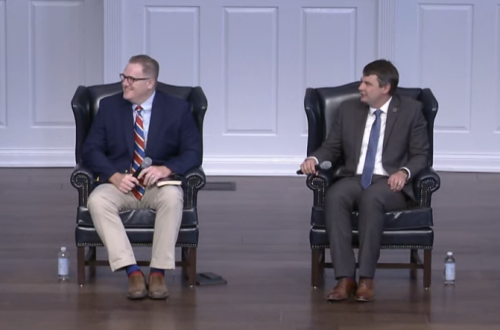My wife and I had been hearing and reading mixed reviews on the Barbie film, so last night we decided to go and check it out for ourselves. I think it’s safe to say that from the jump, the film left us pretty cold. The very first scene shows morose-looking little girls in a dark and barren landscape playing with baby dolls. The desert backdrop and the sullen expressions on the girls’ faces make it clear that playing at maternal stereotypes is oppressive and limiting for a young girl. After all, there is much more to life than the drudgery of motherhood.
So the girls smash their baby dolls into bits and enter into the pink, liberated world of Barbie—a world where women rule and can be anything they choose. It’s also a place where being pregnant is “weird” and stigmatizing. Ironically, one need not be a biological woman to rule in Barbie-world. Indeed, one of the Barbies is a biological man who has transed himself. In Barbie-world, the actual “men” are simpering geldings—evacuated of any trace of virtue or moral strength.
Behind all the pink and sunshine, it’s a really dark picture. Every Barbie—including the main protagonist—is performing a role. They aren’t really being a human, much less actual women. The main Barbie protagonist discovers this fact and eventually leaves Barbie-world for the real world.
At the end of the movie, Billie Eilish croons the central question at the heart of Barbie’s narrative arc—”What was I made for?” Barbie chooses to be human, but for her that means having the ability to forge her own identity. Apparently, her big discovery is that she was made for existentialism.
The movie ends with a beaming, newly human Barbie going to her first gynecologist appointment. The song goes on, “What was I made for?” Will she discover in the ObGyn’s office that she was made for ruling as the mother of all the living? Will she discover that her body bears witness to what she was made for? No. The movie explicitly and uniformly rejects all that as rubbish from the dark ages and from which women have long since been emancipated. So having rejected what she was made for, she now muddles-on making up womanhood as she goes along.
I told my wife over dinner that I’m not mad about the movie. I’m grieved. What grieves me is how many people are under the spell of the nature-denying lie at the heart of this film. Whether people wish to acknowledge it or not, a man is a person whose body is designed for reproducing as a father. A woman is a person whose body is designed for reproducing as a mother. This natural binary has innumerable social consequences. It explains so much of why men and women are different and what they were really “made for.” It also reveals that they were made by a divine agency who designed male and female for a purpose. But no one in Barbie world or the “real world” of the movie is interested in any of that. They don’t embrace the babies. They smash them and jeer at the women who have them.
None of the gags in this film landed with us. It’s not funny to watch a lie wrapped in a pink explosion of gauche nostalgia. Suppressing the truth in unrighteousness doesn’t wear well. A lie is ugly no matter how much you dress it up in washboard abs, perfect pink outfits, and punchlines. So yes, for me I grieved. There was nothing happy about this spectacle.
It just so happens that a day or two before seeing this movie, I completed C. S. Lewis’ Space Trilogy. Going from Lewis’ books to the Barbie movie was like ideological whiplash. Lewis depicts a universe very much in line with the natural order of things—where objects fall toward the earth at 9.8 meters per second squared and where men and women know themselves to be men and women. In Lewis’ reality, the characters know that a woman who rejects her noble vocation has done something tragic and destructive. I am reminded of Merlin’s bracing introduction to Jane Studdock in That Hideous Strength. He is appalled that a wife would reject motherhood as Jane had. Here is Merlin’s trenchant exchange with Ransom about what Jane and the world have lost because of the decision to “smash the babies”:
“Sir,” said Merlin, “know well that she has done in Logres a thing of which no less sorrow shall come than came of the stroke that Balinus struck. For, sir, it was the purpose of God that she and her lord should between them have begotten a child by whom the enemies should have been put out of [England] for a thousand years.”
“She is but lately married,” said Ransom. “The child may yet be born.”
“Sir,” said Merlin, “be assured that the child will never be born, for the hour of its begetting is passed. Of their own will they are barren: I did not know till now that the usages of Sulva were so common among you. For a hundred generations in two lines the begetting of this child was prepared; and unless God should rip up the work of time, such seed, and such an hour, in such a land, shall never be again.”
“Enough said,” answered Ransom. “The woman perceives that we are speaking of her.”
Merlin is right. We have barely begun to understand the destruction wrought by rejecting what God made men and women for. That doesn’t mean that all men and women will marry or even be fertile. The vicissitudes of this age mean that not all will realize this calling. Nevertheless, for a civilization to reject these callings as morose and “weird” is for a civilization to begin to cave in on itself. This deconstruction is a shame and a horror no matter how much pink you throw at it.
At the end of the movie, the toy Barbie tranforms into the very human Barbara Handler. I have a feeling that if Augustine were allowed to speak into the situation, he might tell her that she was made for God and that her heart would be ever restless within her until she found her rest in Him and in His good design. He might also tell her that her Maker made her for royalty and nobility—to rule in this world as the mother of all the living. But would she hear it? Would anyone hear it?






